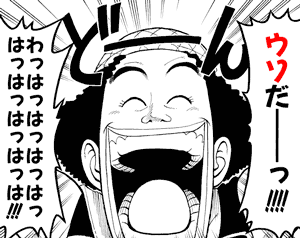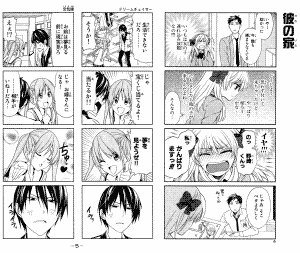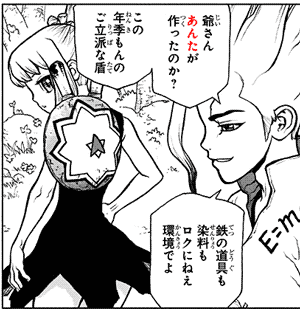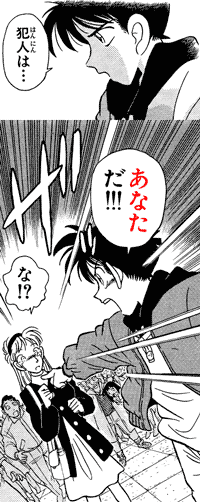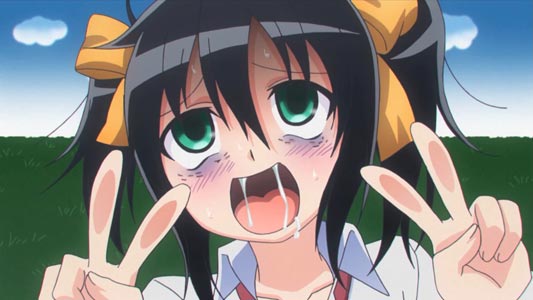uso 嘘
In Japanese, uso 嘘 means a "lie," an "untruth," although it's often translated in other ways.
It's also spelled uso うそ and uso ウソ.
Manga: One Piece (Chapter 23, 〝キャプテン・ウソップ登場〟)
Why is ha は pronounced wa? Particles he へ as e, wo を as o?
4 Koma
In English, yonkoma, or 4 koma, means a "four-panel manga," in Japanese: yon-koma manga 4コマ漫画. These four panel comics are rather unique for a couple of reasons, including the fact that they're read differently from your typical manga.
Manga: Gekkan Shoujo Nozaki-kun 月刊少女野崎くん (Volume 1)
Desu です - Meaning in Japanese
In this article I put together the basics of how they work for people who don't know a bit of Japanese, plus differences and nuances of words such as dearu, dearimasu, degozaimasu, and so on for people who already know a bit of Japanese, in order to answer most doubts you could probably have about them.
- Translation of Desu です
- Kore Wa Is Not "This Is"
- Deshita でした
- Deshita でした vs. Katta かった
- Expressions with Desu です and Deshita でした
- Da だ, Datta だった
- Difference Between Da だ and Desu です
- Janai じゃない
- Janakatta じゃなかった
- Desu Ka ですか, Janai Ka じゃないか
- Daga だが, Desu Ga ですが
- Darou だろう, Deshou でしょう
- No Da のだ, No Desu のです
- Nda んだ, Ndesu んです
- Janee じゃねぇ, Janeeka じゃねぇか
- Dearu である, Deatta であった
- Difference Between Desu です and Dearu である
- De Arimasu であります
- Dewa Arimasen ではありません
- Dewa Nai ではない
- Dewa では and Ja じゃ
- Jaarimasen じゃありません
- Janai Desu じゃないです, Dewanai Desu ではない
- De Gozaimasu でございます
- De Gozaru でござる
- Kanji of Desu です
- Kanji of Dearu である and Dewa Nai ではない
- Cheat Sheet for Desu です
Plurals
-Tachi ~たち, ~達 - Meaning in Japanese - Pluralizing Suffix
Anata, Omae, Temee, Kimi, Kisama あなた, お前, てめぇ, 君, 貴様
anta あんた (Second Person Pronoun)
In Japanese, anta あんた means "you." It's a second person pronoun, and a corruption of the more polite anata あなた. It's also spelled アンタ, with katakana.
anata
In Japanese, anata あなた means multiple things: "you," a second person pronoun, "they," a third person pronoun, and, sometimes, it's a way to call one's "husband."It's also spelled 貴方, 貴女, 貴男, and 彼方.
ahegao
In anime, ahegao アヘ顔 means a certain iconic panting facial expression, an "O-face." It's a recurring trope in drawn pornography (hentai 変態), in non-drawn pornography, and even in non-pornography. Pretty much a meme at this point.
Anime: Watashi ga Motenai no wa Dou Kangaetemo Omaera ga Warui! 私がモテないのはどう考えてもお前らが悪い! (Episode 5)
Not to be confused with ahoge アホ毛, which is something else entirely.
rendaku 連濁
For example: hito 人, "person," reduplicated becomes hitobito ひとびと (人々), "people." The morphemes "nose," hana はな, and "blood," chi ち, merge into hanadi はなぢ (鼻血), "nosebleed," and kami かみ, "god," suffixed to death becomes shinigami しにがみ (死神), "god of death."
The, An, A
After all, those are the definite and indefinite articles, used everywhere in English grammar to determine the definiteness of nouns: "a" cat and "the" cat mean different things.
However, in Japanese, such articles do not exist. You read that right: Japanese does not have articles, at all.
